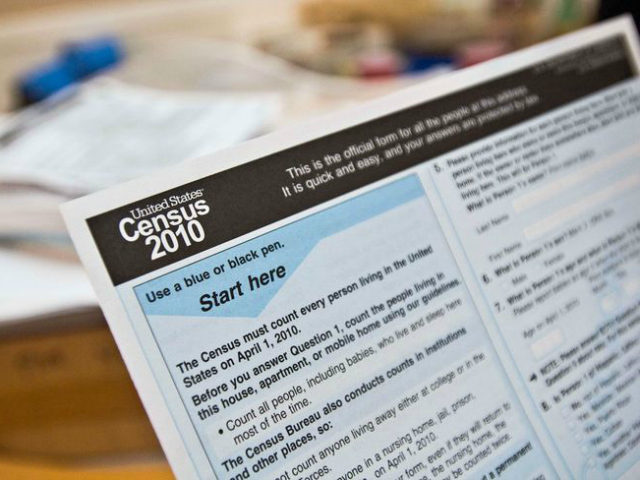If you asked most people whether the federal government knows the number of citizens in the United States after each decennial census, they would answer yes. After all, that’s one of the main purposes of the census. Unfortunately, we don’t get that information.
Believe it or not, the census does not ask respondents whether they are citizens. In fact, the last time the census asked this basic information on the short form was 1950. Thereafter, it remained on the long form (which not all households received) until the long form was terminated after the 2000 census. At that point, the long form was replaced by the annual American Community Survey, which still contains the citizenship question. But only about one percent of the population receives it.
Aside from the obvious fact that every sovereign nation ought to know how many citizens it has, there are even more important reasons to know this information. The very principle of one person, one vote, is at stake.
Right now, congressional districts are drawn up simply based on the number of warm bodies in each district. Not only are legal aliens counted, but illegal aliens are counted too. As a result, citizens in a district with lots of illegal aliens have more voting power than citizens in districts with few illegal aliens.
Think of it this way. There are about 710,000 people in each congressional district. But, if half of the district is made up of illegal aliens, then there are only 355,000 citizens in the district. The value of each citizen’s vote in such a district is twice as high.
That is unfair. As Iowa Representative Steve King (R) put it: “Maxine Waters (D-CA) … only needs about 40,000 votes to get reelected in her district and it takes me over 120,000 in mine because hers is loaded with illegals and mine only has a few.”
And the Supreme Court suggested long ago that that would be unconstitutional. As Justice Black wrote in the landmark 1964 case of Wesberry v. Sanders:
We do not believe that the Framers of the Constitution intended to permit … vote-diluting discrimination to be accomplished through the device of districts containing widely varied numbers of inhabitants. To say that a vote is worth more in one district than in another would not only run counter to our fundamental ideas of democratic government, it would cast aside the principle of a House of Representatives elected ‘by the People,’ a principle tenaciously fought for and established at the Constitutional Convention.
The 1964 Court didn’t consider vote dilution caused by illegal aliens, which hadn’t become a problem yet and wasn’t a question in the case. But it is clear that the same reasoning applies.
If and when the citizenship question is ever returned to the census, and Congress considers excluding illegal aliens from the apportionment process, liberals in districts loaded with illegal aliens will protest that such aliens must be counted in apportionment. But that’s absurd, because a person who’s very presence in the United States is illegal — and who may return home or be deported at any time — cannot be considered a resident of the district in any meaningful sense.
However, that’s an argument for another day. At this point, we just need to know what the numbers are. It’s inexcusable that the federal government remains ignorant of the number of citizens living in our country.
That willful ignorance has other consequences, beyond vote dilution. The federal government needs information—lots of information—to calculate where people are living and moving. Adding the citizenship question will give the government enormously valuable information about the movement of people in and out of the country. For example, we don’t have any idea how many aliens on temporary visas actually leave the country when their visas expire. Plus federal surveys and data collection efforts (like calculating unemployment) would be much more accurate if the census data contained citizenship information.
There’s no good reason to keep the citizenship question off the census. Nevertheless, the liberal media and liberal groups are calling the question “controversial.” But the only justification they offer for keeping the federal government ignorant of how many citizens there are is their ridiculous claim that some people might be afraid to fill out the census form. It’s hard to see why anyone would be afraid, when the federal government is prohibited from using census answers against anyone and when the form itself states very prominently that a person’s answers “are protected by law.”
Plus, the U.S. Census Bureau already asks the citizenship question (as well as more detailed questions about where a person was born) on the American Community Survey and the Current Population Survey. This has been done for years, yet the Left has never complained about the citizenship question. Their current protests ring hollow.
Fortunately, the Justice Department recently asked the Census Bureau to add the citizenship question to the 2020 census. In addition to all of the reasons mentioned above, collecting this information will help the Justice Department better enforce the Voting Rights Act.
Hopefully, the Census Bureau will grant the Justice Department’s request. It’s time to end this ignorance. A great nation must, at the very least, know how many citizens it has.
Kris W. Kobach is the elected secretary of state of Kansas. An expert in immigration law and policy, he coauthored the Arizona SB-1070 immigration law and represented in federal court the ten ICE agents who sued to stop President Obama’s 2012 DACA amnesty. During 2001-03, he was Attorney General John Ashcroft’s chief adviser on immigration law at the Department of Justice. He is also a 2018 candidate for the office of governor of Kansas. His website is kriskobach.com.

COMMENTS
Please let us know if you're having issues with commenting.